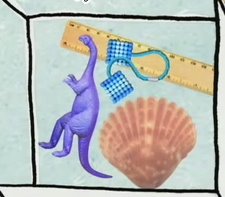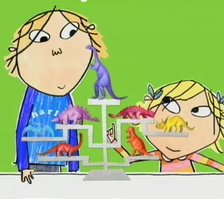 For the last few days, both my kids have been sick. Then I got it, too. Yesterday, we three spent the day at home, curled up under blankets on the couch watching television.
For the last few days, both my kids have been sick. Then I got it, too. Yesterday, we three spent the day at home, curled up under blankets on the couch watching television.Our viewing was restricted to children’s fare (which surprisingly enough can be quite interesting) and one of the shows we watched was Charlie and Lola, a British-animated series about a 7-year-old brother and 4-year-old sister and their everyday life. While it would have been entirely appropriate for us to see “I’m really ever so not well” (from which the picture on the left was snagged), we saw instead “I am collecting a collection” (read and hear it here as an illustrated story).
 The episode opens with Charlie and Lola opening a new box of cereal. Since it’s Charlie’s turn to open the box, he gets to keep the prize: a pterodactyl, which he adds to his dinosaur collection. Lola, inspired by Charlie’s collection, tries to figure out something out to collect like her big brother. She goes through a variety of things, but nothing works out.
The episode opens with Charlie and Lola opening a new box of cereal. Since it’s Charlie’s turn to open the box, he gets to keep the prize: a pterodactyl, which he adds to his dinosaur collection. Lola, inspired by Charlie’s collection, tries to figure out something out to collect like her big brother. She goes through a variety of things, but nothing works out.Finally, it's time to open a new box of cereal, and Lola gets to keep the prize this time. It’s a Ginamasaurus, which happens to be the last dinosaur Charlie needs to complete his collection. Charlie claims it as his, but Lola reminds him that it’s hers because it was her turn to open the box.
 Charlie immediately goes into negotiation mode. “Look, I’ll swap you anything you like,” he says, offering Lola any one of his other collections.
Charlie immediately goes into negotiation mode. “Look, I’ll swap you anything you like,” he says, offering Lola any one of his other collections.Lola shakes her head: “No, because I didn’t collect them! But I did collect the Ginamasaurus.” She shows him her box with the dinosaur and other seemingly unrelated items in it.
“But yours isn’t a proper collection!” Charlie whines. “A proper collection is to find all the same kind of things. And you have to know ALL about them. Like I know all about dinosaurs!”
 Lola sees how much Charlie wants the dinosaur and tells him he can have it if he can guess what her collection is.
Lola sees how much Charlie wants the dinosaur and tells him he can have it if he can guess what her collection is.“But all your things are completely different! Nothing goes together,” he counters.
“But they do all go together because I’ve collected them for all the same reason,” Lola explains. All Charlie sees, however, is a collection of things no one needs. When he can’t guess, Lola finally tells him:
“It’s a collection of things that people DO need, and that I can give to them and they will be very, very pleased!” Lola goes onto explain who each item is for and how it will help and make them happy: the seashell for her mother to put her jewelry in, the ruler for a friend because he needs to measure a dog’s tail, the hair bobble for another friend who lost it, and the dinosaur for Charlie’s collection.
“Here you are,” says Lola, handing the dinosaur to Charlie.
 “Thanks, Lola,” Charlie says, adding the dinosaur to his collection with a happy grin.
“Thanks, Lola,” Charlie says, adding the dinosaur to his collection with a happy grin.“So you see Charlie,” Lola tells her brother, “Mine is a proper collection of things that people really, really need!”
From Lola’s mouth to my heart.
As I’m tossing crumpled-up Kleenexes onto the coffee table, tucking the blanket around my glassy-eyed three year old and making sure my eight-year old is comfortable too, it dawns on me that Lola has summed up in one little sentence how followers of Jesus should treat their stuff: a collection of things that other people need.
Jesus and Paul and the New Testament writers tell us that in the Kingdom generosity is the way of life. Our stuff is meant to be shared (i.e., Acts 20:35; 1 Timothy 6:18; 2 Corinthians 9:11). This broadened (and threatened) the traditional view of money and possessions held by the religious establishment of the time, which demanded that 10% of everything be given to the temple. In The Upside-Down Kingdom, Donald Kraybill points out that tithes and taxes were not viewed as free will offerings but commanded by God, and the Pharisees saw tithing as the path to holiness.
Today, we can be hobbled by the same view: that our “tithe” is the section of our wealth that goes “back to God.” It becomes a sacred act separate from how we treat the rest of our stuff. And like the Pharisees, it can become a religious act we hope will make us holy and more acceptable before God. But in reality, tithing didn’t appear to be a part of the living-together-in-the-Kingdom in the early years of the church. In fact, they were much closer to Lola’s words when it came to how they viewed their stuff than the language we use today about tithing. All their stuff was sacred, not just the money they gave to help others out. And they understood it wasn’t acts like giving that made them holy or righteous—only God could do that. Instead, their acts flowed out of understanding who they were: beloved children of God living in Jesus and his Kingdom.
Taking on a view like that is a big shift. If I view all the stuff we have (not just our money) as resources to use in the Kingdom, then everything can be used. The car we loan to our friends, the music or book I give to a sister, the meal I make for the couple down the street, the granola bars I give to the neighborhood kids, the Crayola crayon stain remover I give to my next door neighbor, the groceries we give to a mother and her son living in a shelter—all of these small things become Kingdom acts. They become not things I collect to display or for my own use, but things I’ve collected along the way that can be used by others.
This idea has been working its way into my heart for years—and it’s far from taken over the greed and selfishness that lurk there. But this kind of thinking leads me to loosen a bit more of my grip on stuff, to actually feel more like giving than getting.
It also makes me think more about trusting and living in Jesus. Because the more I live in Jesus, the more I realize how much I’m loved. And the more I feel like that, the more I want to give. The more I remember who I am and where I live, the more I learn that I don’t act to become holy but act out of His abundant-love and holiness and righteousness in the-God-transformed-and-yet-still-transforming me.
Yes, God’s changing my heart—and along the way he’s using the words of a fictional little girl named Lola to do it. And Amen to that.
(Images: first image, charlieandlola.com; other images, BBC) miscctgy